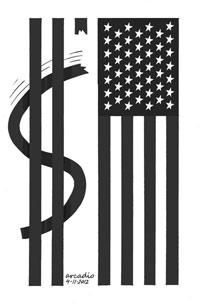Political Arithmetic
How New Data on Voters and Money Will Shape S.B.'s Hottest Political Races
Republican mad-dog strategist Karl Rove, once confronted by a liberal reporter brandishing an unfavorable campaign poll, famously replied, “You’re entitled to your math — I’m entitled to the math.”
Rove’s First Rule of Hardball Politics underscores the bottom line of campaigns: After all the right-left clashes pitting social-justice squishes versus heartless capitalist buccaneers, elections ultimately are a simple matter of numbers.
Sure, the final score in politics depends in part on candidates’ speeches, issue platforms, and calibrated messages, but the difference between winning and losing often comes down to money and mechanics.

Less than six weeks before voters cast ballots in the June 5 primary, here is a look at some key numbers from two new data dumps that will frame Santa Barbara’s fierce fights over the 19th State Senate and the 23rd Congressional districts.
Who Are the Voters? California Secretary of State Debra Bowen last week released her preprimary report on the makeup of the electorate and how it’s changed from the last presidential campaign season in 2008.
The overall number of adults eligible to vote in the state has barely increased, to 23,704,446, but the portion of those registered (72 percent) has jumped by more than one million, to 17,037,414.
Of these, 43.5 percent are registered Democrats, the same share as in 2008, while the segment of Republicans has continued to decline steadily, with GOP voters now just 30.3 percent of the electorate. By contrast, the number of independents not aligned with any party has kept growing, as so-called “decline to states” now measure more than one-fifth (21.3 percent) of voters statewide. The balance is registered with smaller parties.
Who Votes in S.B.? Statewide trends are mirrored in Santa Barbara County, where the number of those registered (187,799) has increased only slightly, the percentage of Democrats (41.5) has remained steady, while Republicans have slipped to 32.2 percent and independents have grown to 21.2 percent of the electorate.
The newly redrawn 19th State Senate District, where Republican Mike Stoker and Democrats Hannah Beth Jackson and Jason Hodge are competing for two spots in the November run-off, has considerably higher Democratic registration than the old district, where GOP Senator Tony Strickland narrowly beat Jackson in 2008.

Democrats now represent 43 percent of the electorate, Republicans 32 percent and independents nearly 20 percent, a dramatic shift from the old 19th, where GOP and Democratic registration was equal. This represents both an opportunity and a risk for front-runner Jackson; she would be favored against Stoker in November, but she first must finish in the top two in June, while vying with Hodge for her own party’s vote.
The new 24th Congressional District (CD) is significantly more difficult terrain for Democrat Lois Capps as she tries to hold on to her seat. In contrast to her huge partisan advantage in the old 23rd CD, registration in the 24th is closely divided between Democrats (38.5 percent) and Republicans (35.5 percent), with independents at 20.4 percent, which is why the national GOP is expected to provide resources to former lieutenant governor Abel Maldonado, assuming he bests Tea Party favorite Chris Mitchum in the primary.
Follow the Money: Recently released quarterly campaign finance reports show both Jackson and Capps dominating the crucial race for money.
Jackson reported $309,512 in the bank, twice as much as Hodge ($150,230); Stoker, who got into the race late, reported just $2,970 cash on hand. Capps meanwhile reported $1,322,657 cash on hand, nearly three times as much as Maldonado, with $492,230; Mitchum reported $113,929, including a $100,000 loan to himself.
Several national politics news organizations, including Politico, which included him on its quarterly list of “flops,” noted Maldonado’s anemic fundraising.
“Maldonado, a former lieutenant governor who’s been named to the National Republican Congressional Committee’s ‘Young Guns’ program for top contenders, drew notice for his own paltry take,” the site said. “He raised just $194,000 — less than half of incumbent Democratic Rep. Lois Capps’s $525,000 haul.”
The veteran Santa Maria politician is also drawing fire from both sides on taxes: In a Tax Day release, Mitchum bashed him for his 2009 budget vote for higher taxes while also noting his ongoing battles with the IRS, an issue first raised by the Capps campaign (see independent.com/birth-and-taxes)



